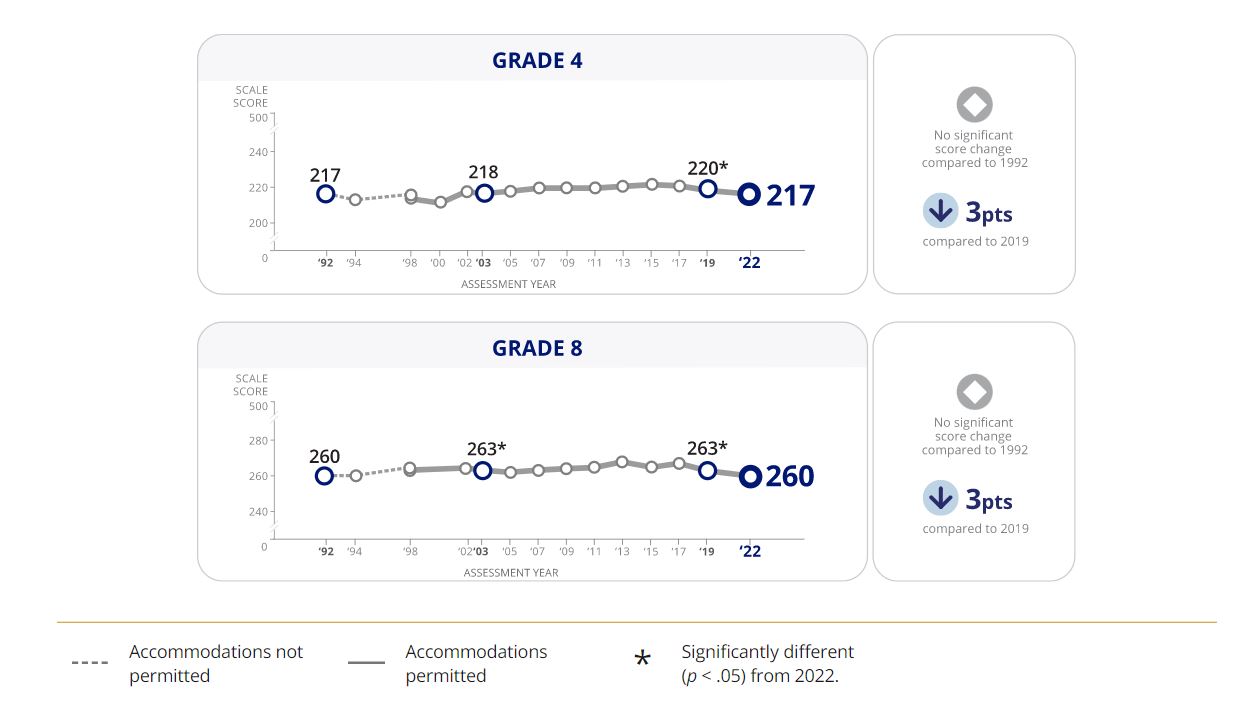Math and Reading Scores Decline on the "Nation's Report Card"
The National Assessment of Educational Progress released its fourth- and eighth-grade assessment on Monday, showing a three-point decline in reading scores from 2019 testing.
The National Assessment of Educational Progress (NAEP) released its fourth- and eighth-grade scores in reading and math on Monday. The Nation’s Report Card showed a decline in scores from 2019 testing.
In 2022, math scores dropped dramatically, five points for fourth graders and eight points for eighth. While reading scores were down, it was not as steep a decline with both groups dropping three points from 2019.
Education Secretary Miguel Cardona called the results “appalling and unacceptable,” adding that it is a “moment of truth” for education.
According to the report, “In 2022, the average reading score at both fourth and eighth grade decreased by 3 points compared to 2019. At fourth grade, the average reading score was lower than all previous assessment years going back to 2005 and was not significantly different in comparison to 1992. At eighth grade, the average reading score was lower compared to all previous assessment years going back to 1998 and was not significantly different compared to 1992.”
In 26 large urban districts, representing nearly 10 percent of the country’s public school students, the majority showed reading scores with no significant change from 2019. Only nine of the 26 for fourth graders and four of the 26 for eight graders showed a decline. Those districts that held steady included New York City, Philadelphia, Boston, and Washington, DC. In Los Angeles, reading scores actually improved for eighth graders.
The pandemic has impacted education in innumerable ways. It is cited as a factor in the decline of test scores, with the closure of school buildings and the further impact of children facing stress, economic distress, and possible illness and death in their family and community. But these declines are a continuation of an issue seen in a decline in scores from results before the pandemic upended the United States. In early 2020, NAEP’s long-term trends for 9- and 13-year-olds showed 13-year-old students’ scores declined in both reading (3 points) and math (5 points) from the 2012 assessment. The 9-year-olds did not show any improvement, holding steady from 2012. In a 2019 report, reading proficiency levels had dropped for both fourth and eighth graders from the 2017 assessment.
“The pandemic simply made it worse,” Cardona told reporters Friday.
The 2022 assessments tried to get more details on the pandemic disruption, asking students if they learned remotely and what resources they had if they did, and broke down those results.
“Of the fourth- and eighth-grade students who learned remotely during the 2020–21 school year, higher performers (those at or above the 75th percentile) had more frequent access to a desktop computer, laptop, or tablet all the time; a quiet place to work available at least some of the time; and a teacher available to help them with English/language arts schoolwork about once or twice a week or more compared to lower performers (those below the 25th percentile),” the report said. “Additionally, higher-performing grade 8 students reported more participation in real-time video lessons with their teacher every day or almost every day compared to their lower-performing peers.”
This report comes after the release in July of a special long-term assessment of 9-year-olds in an attempt to gauge the impact of the pandemic. In that study, reading scores dropped five points from 2020 to 2022.
|
A breakdown of the fourth grade reading numbers:
|
|
A closer look at the eighth grade reading assessment:
|
RELATED
The job outlook in 2030: Librarians will be in demand
The job outlook in 2030: Librarians will be in demand
ALREADY A SUBSCRIBER? LOG IN
We are currently offering this content for free. Sign up now to activate your personal profile, where you can save articles for future viewing






Add Comment :-
Be the first reader to comment.
Comment Policy:
Comment should not be empty !!!